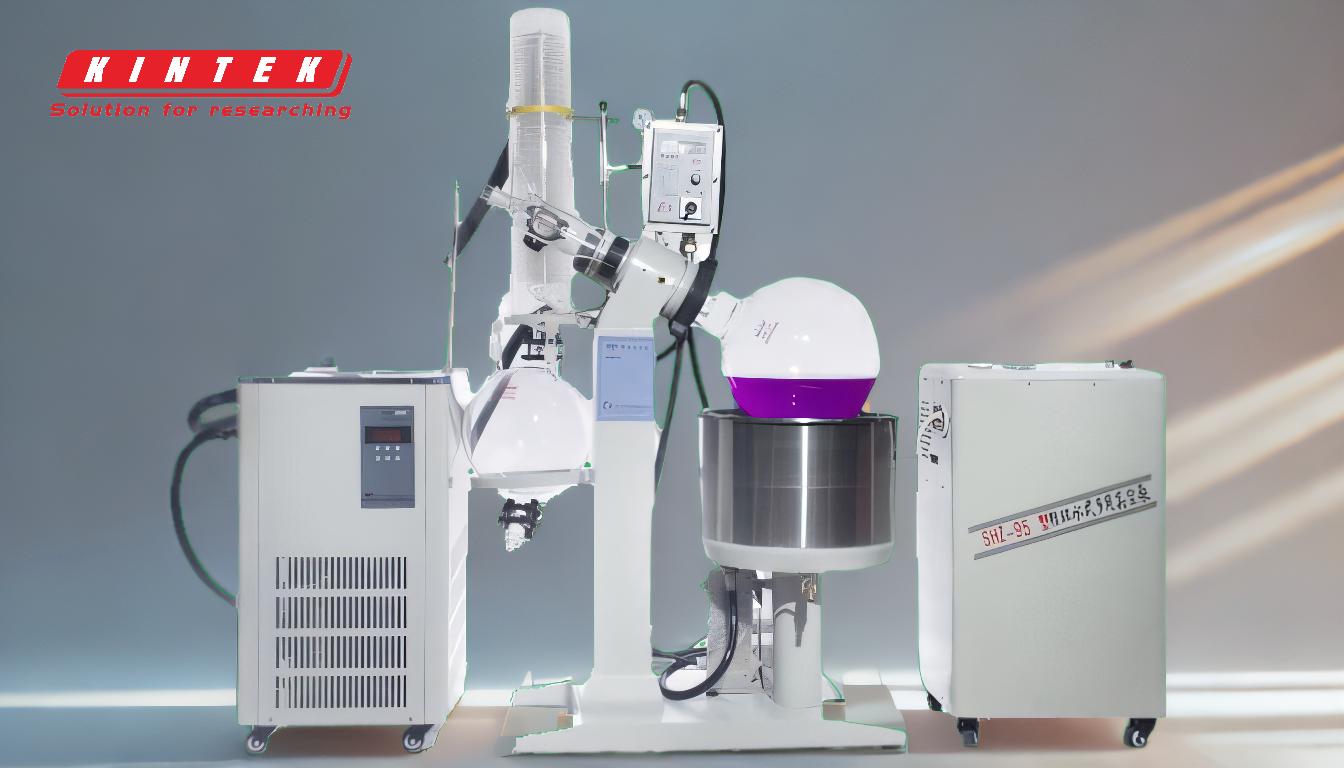A rotary evaporator, often referred to as a rotavap, is a laboratory device designed to efficiently remove solvents from samples through evaporation under reduced pressure. Its primary purpose is to separate low-boiling solvents from mixtures, particularly when the target compounds are solid at room temperature and pressure. This method is faster and more efficient than traditional evaporation techniques, as it reduces the boiling point of the solvent by lowering the pressure, rotates the sample to increase the surface area for evaporation, and gently heats the solution. Rotary evaporators are widely used in organic laboratories for tasks such as isolating compounds, purifying samples, and concentrating solutions, making them indispensable tools for chemists and researchers.
Key Points Explained:

-
Efficient Solvent Removal
- The rotary evaporator is specifically designed to remove solvents from samples quickly and efficiently.
- It achieves this by operating under reduced pressure, which lowers the boiling point of the solvent, allowing it to evaporate at lower temperatures.
- This method is particularly useful for separating low-boiling solvents like ethyl acetate (EtOAc) and n-hexane from mixtures.
-
Gentle Evaporation Process
- Unlike traditional distillation or evaporation methods, the rotary evaporator minimizes the risk of thermal decomposition of sensitive compounds.
- By rotating the sample, it increases the surface area exposed to the vacuum, enabling faster and more uniform evaporation.
- This gentle process is ideal for extracting delicate aroma compounds or isolating heat-sensitive materials.
-
Versatility in Applications
- Rotary evaporators are commonly used in organic laboratories for tasks such as isolating reaction products, purifying compounds, and concentrating solutions.
- They can handle volumes as large as 3 liters, making them suitable for both small-scale and larger-scale applications.
- While they are most effective for low-boiling solvents, they can also be adapted for high-boiling solvents like water or dimethylformamide (DMF) when paired with a robust vacuum system and pre-treatment steps (e.g., using drying agents).
-
Advantages Over Traditional Methods
- Rotary evaporators are faster and more efficient than evaporation under atmospheric pressure.
- They reduce the need for excessive heating, which can degrade or decompose sensitive compounds.
- The combination of reduced pressure, rotation, and controlled heating ensures a more controlled and reproducible process.
-
Common Use Cases
- In organic synthesis, rotary evaporators are used to isolate and purify reaction products by removing solvents.
- In the food and fragrance industries, they are employed to extract and concentrate delicate aroma compounds without exposing them to high temperatures.
- In analytical chemistry, they are used to prepare samples for further analysis by concentrating solutions.
-
Limitations and Considerations
- Rotary evaporators are less effective for solvents with very high boiling points unless equipped with a high-performance vacuum system.
- Pre-treatment steps, such as using drying agents, may be required for solvents like water.
- Proper maintenance and calibration are necessary to ensure consistent performance and avoid contamination.
In summary, the rotary evaporator is a versatile and indispensable tool in laboratories, offering a fast, efficient, and gentle method for solvent removal. Its ability to operate under reduced pressure, combined with controlled heating and rotation, makes it ideal for a wide range of applications in organic chemistry, analytical chemistry, and industrial processes.
Summary Table:
| Key Feature | Description |
|---|---|
| Efficient Solvent Removal | Removes solvents quickly under reduced pressure, lowering boiling points. |
| Gentle Evaporation Process | Minimizes thermal decomposition, ideal for heat-sensitive compounds. |
| Versatility | Used in organic synthesis, food/fragrance industries, and analytical chemistry. |
| Advantages | Faster, more efficient, and controlled compared to traditional methods. |
| Limitations | Less effective for high-boiling solvents without a robust vacuum system. |
Discover how a rotary evaporator can streamline your lab processes—contact us today!










